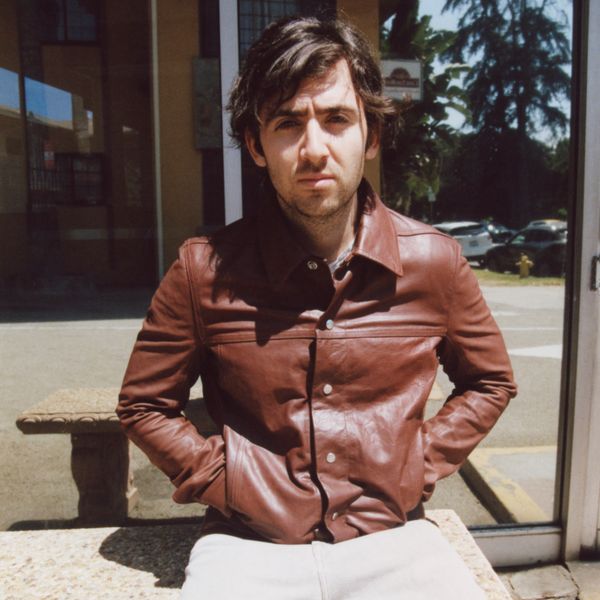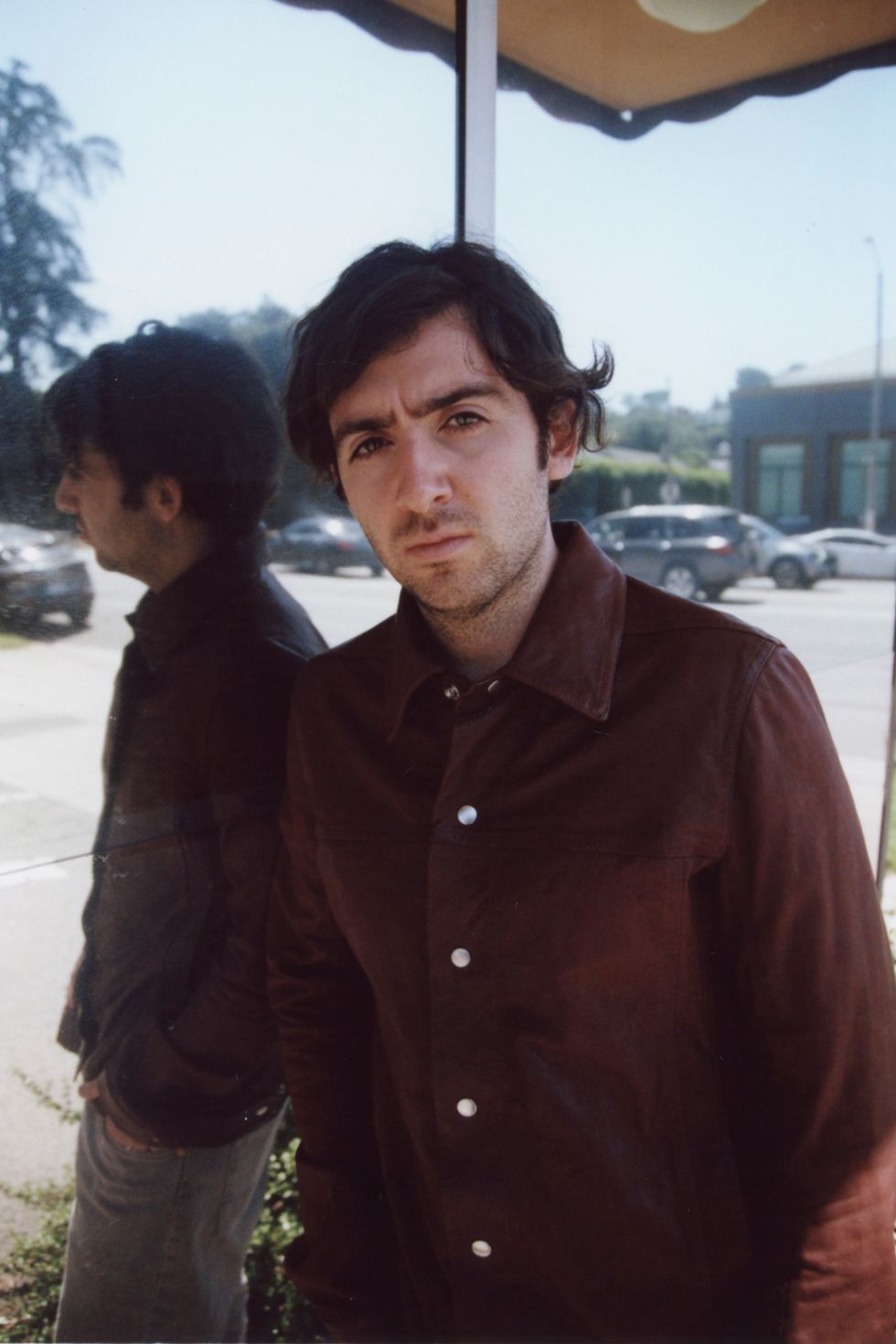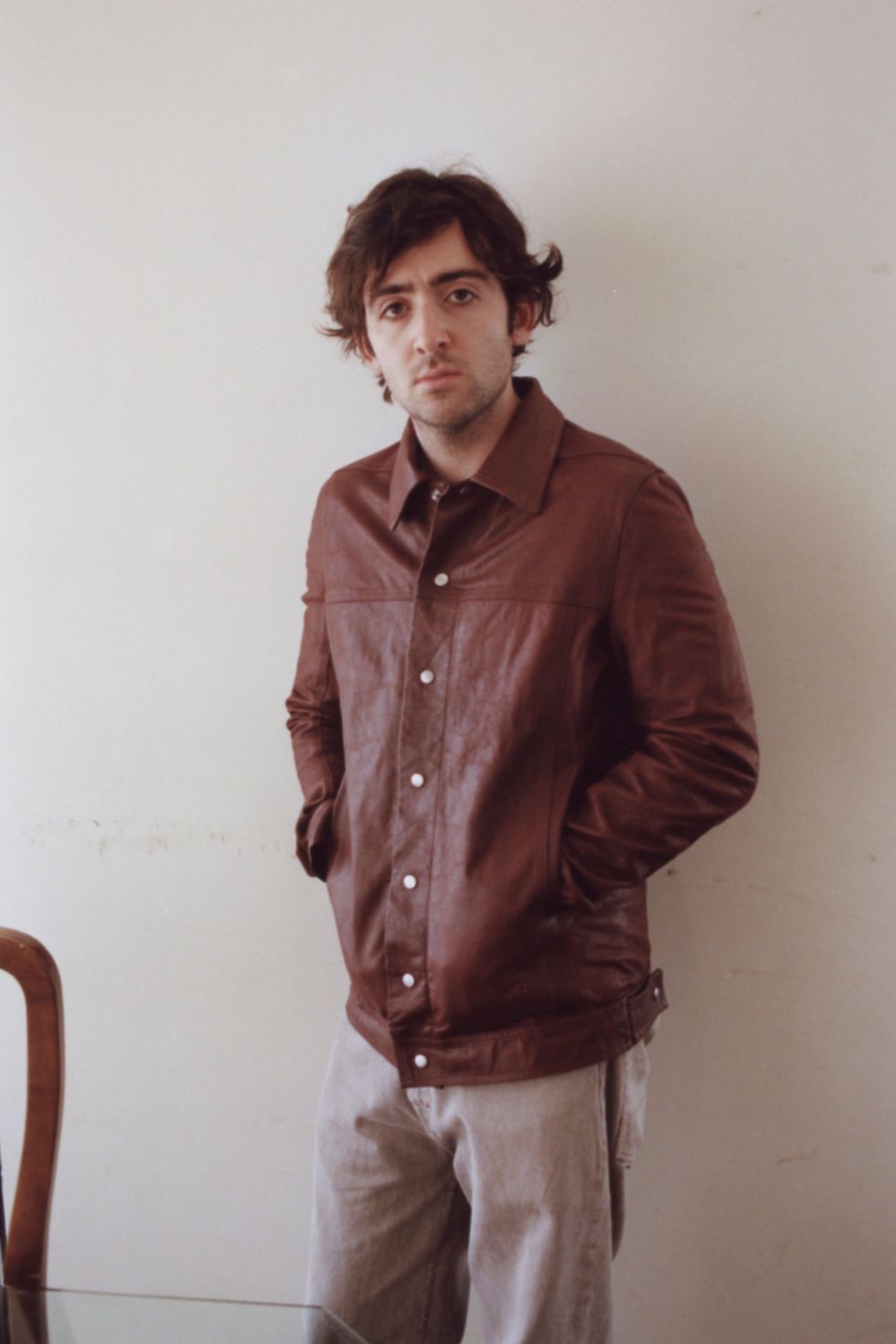
Harley Chamandy Questions Reality With 'Allen Sunshine'
By Ivan Guzman
Nov 15, 2024Harley Chamandy just wants the average movie-goer to meditate. “I wanted to make a film that didn’t hold the viewer hostage,” he tells PAPER. “Something meditative and beautiful, almost like you could just surrender to it.”
That film would be Allen Sunshine, the debut feature-length film from the Montreal-born, Lebanese/Greek-Egyptian director. Shot on entrancing 16mm, the film follows protagonist Allen, an ex-music producer who moves to the remote woods to isolate and mourn the tragic death of his pop vocalist wife. The movie is about loss and newfound friendship and poses the question, “What is reality?”
Having premiered at the Munich Film Festival earlier this year, Allen Sunshine also just won the coveted Werner Herzog Film Prize — a monumental feat typically only awarded to more seasoned, Academy Award-winning directors well beyond Chamandy’s age. For the 25-year-old, being the recipient of this award means everything and positions him as an auteur to watch. With Allen Sunshine available for streaming now, we sat down with the director to discuss how vintage Margiela played a part in the film, being alone and questioning reality.
Congrats on winning this big award. Who else has won this award?
Some amazing filmmakers that I look up to like Chloe Zhao, who won the Academy Award for Nomadland. She also just did Marvel’s Eternals. She’s one of the biggest directors in Hollywood. Also, Asghar Farhadi, he’s an Iranian director. He won this award, and he’s considered one of the greatest living directors. First of all, when I got the email from Herzog, it went to my junk mail, which was pretty funny. But really, it was wild to get an email from him saying, “I watched your film twice, and I would like to offer you my award.” I’m going to Germany in December to screen the film at the Film Archive in Munich and do a Q&A with Herzog. Obviously, I’m humbled and this award has opened up so many doors.
What’s your background before Allen Sunshine? How long have you been into filmmaking?
I’ve been making short films since I was 14 years old. I started off as a child actor. I did a movie for the SyFy network, and I had some small roles in other things. My mom, Chantal, is a singer and performer. She saw that I was getting into movies so she thought, like, why don’t I start helping him out in terms of being a creative partner? Obviously, young kids who start making movies usually do it with their friends and stuff, but my mom was always my homie. At 17, I made my first “official” short film, which she produced, called The Final Act of Joey Jumbler. I’m still super proud of it. That movie really set a template for me, and shaped how I wanted to make Allen Sunshine. It’s a sensitive movie.
Yeah, I watched it and the whole time it’s like I was waiting for something bad to happen.
That’s interesting. I wanted to make a film that didn’t hold the viewer hostage, something meditative and beautiful, almost like you could just surrender to it. You don’t watch many art house films, right?
No, not really.
So, for you to watch something like this, you’re probably like, ‘Okay, it’s a bit slower than usual.’ But that’s a sensibility that I think is beautiful and maybe missing in our generation. What do you think?
Yeah, the smaller moments in the film feel really big.
I really wanted to make a quiet film about love and what it means to live without it. Also, I wanted to make a film about optimism. I think there is plenty of art that is cynical and nihilistic. A lot of it is great, but I wanted to make something sincere. I don't know, I’m just attracted to things that make you surrender to the moment, in movies, in art in general.

There was a twist at the end with the phone call.
Well, there’s something uncanny about it that I liked. At some level, it's about longing and desire. It also introduces a non-linear element that I thought was important. But I think the question for me is, what is our reality? Allen exists in this reality of fame, success, and celebrity. But if he learns to open himself up, can he learn to live a new reality? So that was the question of if the phone was real or not. For the viewer themself to question, what is your reality? What is your truth?
He keeps getting phone calls and no one’s there.
And same thing with the fish. It’s like, is it real? Is it not? It seems naive but it’s a deep question to me because I feel like sometimes we get very caught up with our own realities that we never think we can live differently. It holds a lot of human beings back from fulfilling their full potential.
The film is also kind of timeless. You don’t know which era it’s supposed to be in.
That was a huge thing for me. Even though I had a prop person, I chose every single prop myself. Every detail, from the clothing to the designers, we chose. It’s a lot of Margiela, old Japanese designers, Alexander McQueen. They’re designs that could exist both then and now. Same thing with the props, the car, and the camera. I feel like when there’s a time period, then it starts to feel outdated if you watch it in ten years. I tried so hard [to do that], so it’s really cool that you picked up on that.
I love movies like that. What are your top three movies of all time?
Landscape In The Mist by Theo Angelopoulos. Gummo by Harmony Korine. And then maybe Aguirre, the Wrath of God by Werner Herzog. Can I give two more?
Sure!
Lilya 4-ever by Lukas Moodysson. And I think I gotta give one last one to The Piano Teacher by Michael Haneke.
You’re an only child. Do you think that’s played into your work at all?
Definitely. During high school, I was the type of kid who stayed home and would watch three-and-a-half hour Japanese films. That was my vibe in high school. Toward the end of it, I was really happy being alone. Being an only child taught me that being alone is one of my strongest super powers. I feel like a lot of people these days are not good with being alone. So I definitely view that as an asset.
Who are some of your contemporaries, or other young filmmakers doing something similar to you?
Hmm. I don’t know, it’s so hard. When you ask me about who my contemporaries are in film, it’s hard to think of it, but if you ask me about visual art and music, that’s easier. I just made friends with this artist who I can shout out, his name is Edward Skeletrix. Even though he’s making rap music and photography, we speak the same language. I view him as a contemporary. He’s fire. I’ve always been trying to find a way to merge the worlds of music, fashion and film together.

How did you find the actor who plays Allen?
He’s a popular Quebecois actor. He was in The Revenant. We had a casting director, Ginette D’Amico, that I’ve worked with since I was 14, who was super helpful. But Joseph Whitebird, who is from Manitoba, never acted in his life before. He’s been a long haul truck driver for thirty years. We did an open casting call, and he submitted. I just knew it had to be him.
You mentioned Margiela and the fashion playing a big part in the details of the film.
Yeah, a lot of the clothes in the film are old vintage Margiela. I really draw a lot on what other artists, not just filmmakers, are doing, from fashion designers to musicians and so on. I’m especially inspired by fashion designers because they’re creating these whole detailed worlds. That’s what I’m trying to do with my films. I never really related to filmmakers who call themselves “storytellers.” I hate that word. I’m way more interested in developing an aesthetic point of view.
How does Allen Sunshine deal with masculinity?
I think my film deals with masculinity almost in the traditional way. Obviously, the little boy with the eye patch says a lot of things about his dad not being there, all these things he wants to do with his dad. So, what is he learning from Allen? Also, Allen is not afraid to grieve and show emotion, so those things obviously touch on the theme of masculinity, but it's not a huge part of the film. I think it's amazing how democratized the film world has become. As more people are able to make films, though, I’d love to see young filmmakers move away from “storytelling.” Film is a visual medium. I want the next generation of filmmakers to have really strong aesthetic points of view.
Yes.
That’s something I’ve always wanted to articulate better. It’s a fine line. Obviously, movies tell stories, and people should feel empowered to tell stories through film. I’m just partial to the idea that directors have to have a strong aesthetic sensibility. It’s liberating to think in those terms. I’m after transcendence. But I should say that I do love all kinds of movies.
What’s your favorite “mainstream” guilty pleasure film?
Benchwarmers (2006). You know what, Talladega Nights (2006), actually. Do you like that movie? That’s, like, my favorite movie of all time.
Photography: Parker Hao
Related Articles Around the Web
MORE ON PAPER
ATF Story
Madison Beer, Her Way
Photography by Davis Bates / Story by Alaska Riley
Photography by Davis Bates / Story by Alaska Riley
16 January
Entertainment
Cynthia Erivo in Full Bloom
Photography by David LaChapelle / Story by Joan Summers / Styling by Jason Bolden / Makeup by Joanna Simkim / Nails by Shea Osei
Photography by David LaChapelle / Story by Joan Summers / Styling by Jason Bolden / Makeup by Joanna Simkim / Nails by Shea Osei
01 December
Entertainment
Rami Malek Is Certifiably Unserious
Story by Joan Summers / Photography by Adam Powell
Story by Joan Summers / Photography by Adam Powell
14 November
Music
Janelle Monáe, HalloQueen
Story by Ivan Guzman / Photography by Pol Kurucz/ Styling by Alexandra Mandelkorn/ Hair by Nikki Nelms/ Makeup by Sasha Glasser/ Nails by Juan Alvear/ Set design by Krystall Schott
Story by Ivan Guzman / Photography by Pol Kurucz/ Styling by Alexandra Mandelkorn/ Hair by Nikki Nelms/ Makeup by Sasha Glasser/ Nails by Juan Alvear/ Set design by Krystall Schott
27 October
Music
You Don’t Move Cardi B
Story by Erica Campbell / Photography by Jora Frantzis / Styling by Kollin Carter/ Hair by Tokyo Stylez/ Makeup by Erika LaPearl/ Nails by Coca Nguyen/ Set design by Allegra Peyton
Story by Erica Campbell / Photography by Jora Frantzis / Styling by Kollin Carter/ Hair by Tokyo Stylez/ Makeup by Erika LaPearl/ Nails by Coca Nguyen/ Set design by Allegra Peyton
14 October




